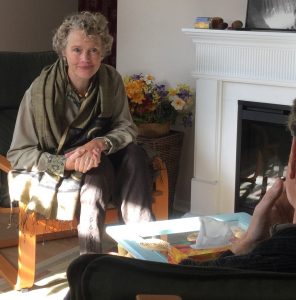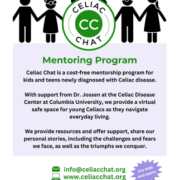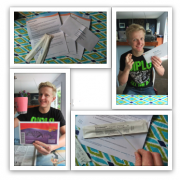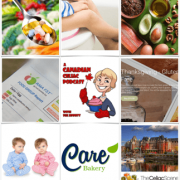Nine Ways to Navigate Gluten-Free Dietary Success!
Sherry Scheideman, Registered Clinical Counsellor provides emotional tools to help you – or your child – go gluten-free. Using the famous “Stages of Change” model, learn how to minimize trauma and empower yourself with every chance for success!
Celiac Counsellor’s Corner* is a place where Sherry Scheideman, M.A., Registered Clinical Counsellor, responds to your questions about the emotional and social issues that celiacs face. Diagnosed with celiac disease herself in 2001 in Victoria, BC, Sherry draws upon personal experiences and a Master’s Degree in Counseling to support you in transcending this ‘life transition’ and turning it into an opportunity to live your best life – ever.
Do you have a comment or question for Sherry?
“Stages of Change” is a clinically proven method, developed by a team of leading psychologists, to help people make the changes they want in their lives.
Look closely at these nine ways of helping yourself (or your child) make this difficult dietary change. You will notice that you are strong in some of the nine ways, and weak in others. Take a few minutes to think of things you can do to strengthen those weak areas. This will make successfully changing to and maintaining a gluten-free diet much easier for you.
1. Raise Your Level of Consciousness about Eating Gluten-Free
- Look for and think about information on going gluten-free.
- Read about people who have successfully gone gluten-free.
- Recall information you have heard about the benefits of going gluten-free.
2. Look at How Your Social Influences Are Affecting Your Efforts to Go Gluten-Free
- Seek out social situations in which it is easier to be gluten-free.
- Associate with people who are willing to change in ways that make it easier for you to be gluten-free.
- Notice when others who are going gluten-free assert their right to gluten-free choices.
3. Use Emotional Arousal to Help You Go Gluten-Free
- If the effects of gluten don’t happen to you immediately, and you feel that the serious consequences are too distant or long-term to matter, try the following ways of getting your emotions involved:
- Watch dramatic portrayals of bad long-term effects of gluten on celiacs.
- Use your imagination to bring the future ill effects of gluten into the present, as if you were dealing with them now.
- Read about and listen to warnings about the long-term effects of eating gluten.
4. Re-evaluate Yourself as Being Happier Gluten-Free
- Think about ways your friends and family would be better off with you being gluten-free.
- Think about how disappointed you are in yourself when you consume gluten.
- Realize that being content with yourself involves being gluten-free.
5. Truly Commit to Being Gluten-Free
- Tell yourself that if you try hard enough, you can go gluten-free.
- Use your willpower to resist consuming gluten and to resist risky food options.
- Tell yourself that you can choose to be gluten-free.
6. Reward Yourself for Successes as You Go Gluten-Free
- Do something nice for yourself in return for being gluten-free.
- Rather than punishing yourself if you slip up, reward yourself for noticing the slip-up and vowing to carry on going gluten-free.
- Reward yourself for small steps in going gluten-free.
- Notice how other people try to make you feel good about going gluten-free.
7. Counter Your Urges to Consume Gluten or to Eat Risky Foods
- When you feel the urge to consume gluten or risky food, try to relax.
- Find gluten-free foods that are a good substitute for your favourite gluten or risky foods.
- When feeling the urge to consume gluten or risky foods, think about or do something else.
8. Take Control of Your Environment in Whatever Ways You Can to Help Yourself Go Gluten-Free
- Remove gluten and risky food from your home.
- Leave places where other people are encouraging you to consume gluten or risky foods.
- Put things around your home or workplace that remind you not to eat gluten or risky foods.
- Relate less often to people who contribute to your eating gluten or risky foods.
9. Lean on the Help of Others
- Find someone who listens when you need to talk about going gluten-free.
- Have at least one person you can talk to about your experiences going gluten-free.
- Have someone you can count on when you’re having problems going gluten-free.
- Have someone who understands your problems going gluten-free.
This is all hard work! But remember — the work you do at going gluten-free will give you skills you can use in every other area of your life.
Sherry
- If you have a celiac-related emotional or social issue you’d like me to address, please leave a comment in the Facebook field below or click here.
- View previous Celiac Counsellor Corners enter ‘Sherry‘ into the search field at the top right of this page

“Life happens! Why not love it?”
“Being diagnosed with celiac disease and going gluten-free has challenged me to develop inner resources that I never knew I had, and I’m grateful for that. As a counsellor, I love to help other celiacs find their own gifts within the challenges of the disease, and to facilitate healing. Why not let your celiac disease motivate you to be your best self?”
- About Sherry Scheideman
- What happens in a session?
- Not in Victoria? No Problem. Sherry does Skype
- Be inspired – Sherry’s Blog
- Sherry Scheideman on Facebook
- Contact Form
Sherry writes about the issues that we as celiacs face in Celiac Counsellor’s Corner. The following topics – and more – will be addressed:

- blaming ourselves or feeling guilty for having the disease
- feeling frustrated and sad about all the food we can’t have anymore
- facing social, familial, and workplace difficulties because we can’t eat what everyone else is having
- being afraid we might not be able to get anything safe to eat when we’re out
- having to ask endless questions about food to make sure we can eat it
- having to endlessly refuse offerings of food in order to stay safe
- occasionally getting “glutened” and then enduring not only the illness but possibly also the blame from ourselves
- how to handle gluten-free shaming
In her articles, Sherry will examine how we can feel like victims as we face the issues that celiac disease presents — and then will explore how these issues give us the opportunity to become our best selves as we rise to meet their challenges. We may find that we can even be grateful to celiac disease for giving us the challenges we need.
- As Pema Chodron notes, “When we reach our limit, a hardness in us will dissolve. We will be softened by the sheer force of whatever energy arises – the energy of anger, the energy of disappointment, the energy of fear. That very energy pierces us to the heart, and it opens us. Reaching our limit is like finding a doorway to sanity and the unconditional goodness of humanity.”
- *Information and perspectives provided in Celiac Counsellor’s Corner are intended to provide general information, without independent verification on the part of The Celiac Scene for the accuracy of the information provided to it. The information is specifically not intended to be a substitute for medical diagnosis or treatment by your physician or other health care professional. You should always consult your own physician or other health care professionals about any medical questions, diagnosis, or treatment, especially before trying any diet. The Celiac Counsellor’s Corner does not accept any liability for any injury, loss or damage incurred by use of or reliance on any content contained herein.













